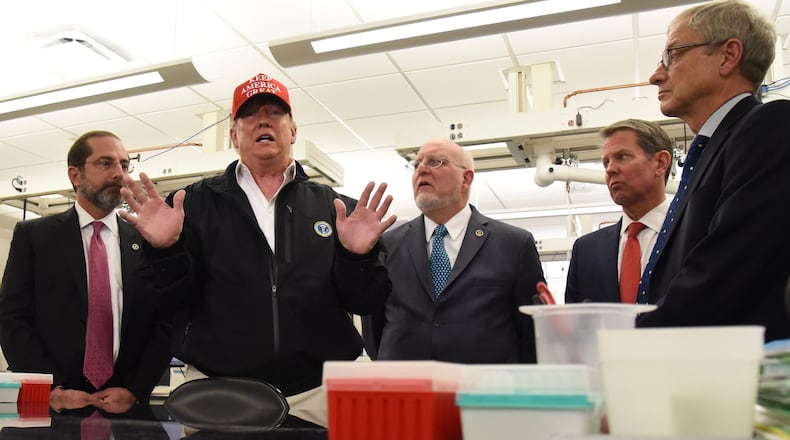President Donald Trump almost didn’t make the trip to Atlanta to address his administration’s response to the coronavirus. But when he arrived at the U.S. Centers for Disease Control and Prevention’s main Atlanta campus, he didn’t seem to want to leave.
After initially scrapping the trip, the president gave an extended press conference at a lab in the CDC facility where he boasted about the agency’s “fantastic work” and declared the nation ready for an outbreak that’s shocked the U.S. economy and tested its health care infrastructure.
Wearing his bright-red re-election hat, Trump asserted that “anybody that needs a test gets a test,” and he lashed out at the governor of Washington state, calling Democrat Jay Inslee a “snake” for criticizing the administration’s approach to the disease.
PHOTO GALLERY: Trump visits CDC in Atlanta amid coronavirus outbreak
He also said he’d prefer if the roughly 3,500 people aboard a Grand Princess cruise ship idling off the coast of San Francisco remain on board after 21 passengers tested positive for the coronavirus. He expressed concern that it would shake the nation’s confidence if the ship’s soaring number of cases were added to the U.S. count of infected residents.
“I don’t need to have the numbers double because of one ship,” he said, adding: “That wasn’t our fault.”
The trip to Atlanta almost didn’t happen. The White House canceled the visit late Thursday because it said the president didn’t want to “interfere” with the agency’s work. But Trump contradicted his aides with a different reason.
He told reporters the visit was canceled because someone at the CDC suspected he or she had the virus, but that it was put back on his schedule after the individual was tested and it came back negative. For hours, there was uncertainty about whether he would arrive on Friday, triggering confusion even among high-ranking politicians.
The trip was designed to highlight the Trump administration’s response to coronavirus, an illness that has been linked to multiple deaths in the U.S. and hundreds of confirmed cases across the nation, mostly in Washington state and California.
Trump sought to exert confidence about his handling of the disease, even as the stock market took another tumble and investors rushed to buy government bonds. At one point, he lamented the turbulence in an economy he said was running “like clockwork.”
On the same day dozens of events were canceled, including the annual South by Southwest festival in Austin, Texas, Trump urged corporations to be wary of scuttling events. “I wouldn’t be generally inclined to do it,” he said.
And he stressed that his personal behavior hasn’t changed because of the spread of the illness, saying he’s “not at all” refusing to shake hands and also not considering canceling political rallies. The virus “doesn’t bother me at all, and it doesn’t bother them at all,” he said of his supporters.
More testing, research in works
Trump has tried to reframe his handling of the illness after facing criticism for trivializing the extent of the threat and for fuming at Dr. Nancy Messonnier, a top CDC official, after she spoke of the likelihood of a potential outbreak in the U.S. She was not among the group of CDC scientists and administrators who joined Trump on the tour.
Shortly before boarding Air Force One, Trump signed an $8.3 billion package of emergency aid for coronavirus response, which includes more than $3 billion for research and development of test kits, treatments and vaccines. The amount vastly exceeded the $2.5 billion in emergency funding the White House initially proposed.
The CDC, too, has faced intense scrutiny over its approach to the illness. Lawmakers grilled CDC officials about the agency's response to the outbreak this week, and experts have sharply criticized its strategy. Standing beside Trump, several of the agency's administrators vowed more tests and more research of the virus were in the works.
U.S. Surgeon General Jerome Adams, during a press conference Friday in Atlanta, said federal authorities are preparing to rapidly expand the nation's testing capacity.
The illness has spurred worldwide economic anxiety and triggered sharp fluctuations in the stock market. Several states have declared emergencies, including California, though Gov. Brian Kemp said Thursday that it’s too early to take the same measure in Georgia.
The governor accompanied Trump during the visit, too, and highlighted his recent announcement that the state medical lab can now test for the disease without having to rely on the CDC.
He was joined by U.S. Sen. David Perdue, one of Trump’s top allies, along with two rivals: U.S. Sen. Kelly Loeffler and U.S. Rep. Doug Collins, who are running against each other for the Senate seat in a November special election. The three stood silently behind Trump for parts of his lengthy press conference.
Kemp was also joined on the tarmac by members of the coronavirus task force he unveiled last week to help develop the state’s strategy to the illness, which has sickened several residents.
Earlier this week, Kemp announced that a Fulton County father and his teenage son were the first in Georgia to test positive for the illness. A health officials said a third patient receiving treatment at a hospital in Rome, Ga., has preliminarily tested positive for coronavirus.
The illness, known as COVID-19, is characterized by fever and coughing and, sometimes, pneumonia and shortness of breath. Around the world, there were more than 100,000 cases and at least 3,300 deaths from the virus, most of them in China.
About the Author
Keep Reading
The Latest
Featured



